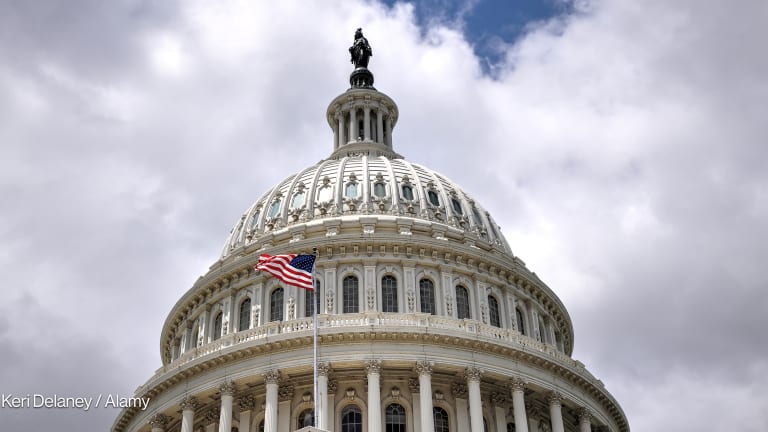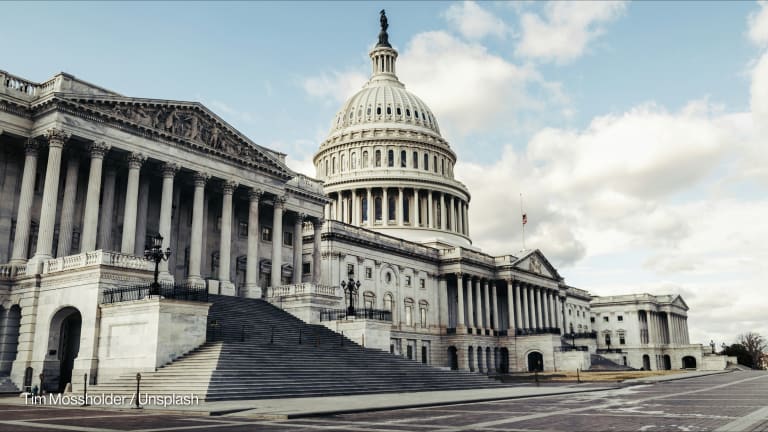
The debate over a recent piece of congressional legislation illustrates the tension that the U.S. International Development Finance Corporation faces between its development mandate and the desire of politicians and policymakers to use it as a tool for their foreign policy objectives.
The nearly two-year-old agency has been pulled in multiple directions since its founding. But the attention may also mean that a long-sought budget fix that could unlock the agency’s ability to do equity investments at scale is on the agenda, along with a plan to raise its investment cap.
The initial version of the Ensuring American Global Leadership and Engagement Act, or EAGLE Act, included a section that would have allowed the DFC to invest in high-income countries. The bill, introduced in May, is aimed at boosting U.S. global engagement and countering China. It’s not the first and is unlikely to be the last, effort to stretch the DFC’s scope beyond its focus on low- and lower-middle-income countries.
Allowing the DFC to invest in upper-middle- or high-income countries “fundamentally misunderstands what the DFC is and what a DFI is,” said Conor Savoy, a senior fellow at the Center for Strategic and International Studies.
“My concern is that the DFC is just becoming a football for each administration. It is still a new, shiny object and everyone is applying a new lens,” he told Devex.
Sign up for Devex Invested
The weekly newsletter on how business, social enterprise, and development finance leaders are tackling global challenges.
And outside experts aren’t the only ones with concerns about the impact of tying the agency to foreign policy objectives — be they climate finance, countering China, or supporting countries in the Western Hemisphere.
“The agency is being pulled in all sorts of directions,” said a DFC official who was not authorized to use their name in speaking to Devex. “We’re all things to all people, and no one really gets what we do.”
Section 116 and where DFC will invest
When it was originally introduced, the EAGLE Act included section 116, which would have authorized the DFC to invest in upper-middle- and high-income countries in projects that “address key national security and economic interests.”
“The DFC is authorized to and should support projects in any country regardless of income status when not doing so would damage the United States interest or those of its allies and partners vis-à-vis its global strategic competitors,” the bill read.
The language would have undermined the development focus in the DFC’s authorizing legislation and further complicated a tenuous balance between development and foreign policy or national security priorities at the agency, experts told Devex.
“If the DFC is turned into a slush fund for every foreign policy objective, it will destroy the DFC and its political support base.”
— Anonymous development expertCongress has approved an exemption to the DFC’s low- and lower-middle-income country focus in the past — notably in the European Energy Security and Diversification Act of 2019, which gives it the authority to make investments in energy projects in high income European and Eurasian countries.
Allowing exemptions on a larger scale would bring into question the DFC’s role as a development finance institution, several development experts and advocates said.
“You want national security projects to be exceptions, not the core business of the agency,” a development expert who requested anonymity in order to share details of the negotiations, told Devex. “If you lift the guardrails, the internal incentives will be to get big, sexy, high-profile projects out the door, and no incentive to do high impact development projects … in the kind of markets for which the DFC was created.”
The DFC had an internal debate about the language in section 116, the DFC official said and sent comments to the committee saying that it would take the agency away from its development mandate.
While the inclusion of the section caught some development advocates off guard, a flurry of last-minute advocacy resulted in that section being struck down via an amendment from Rep. Sara Jacobs, a Democrat of California.
The debate on the issue may not be over, though. Future iterations of this provision could emerge as lawmakers look to the DFC as a tool in countering China.
“If we believe there is a genuine need for the U.S. government to provide financing for high-income countries or upper-middle-income countries, then we need to consider if we have the right tool available,” Savoy said, adding that that tool is not necessarily the DFC.
The equity fix and DFC growth
The current version of the EAGLE Act, which passed the House Foreign Affairs Committee but awaits further action, includes an amendment that offers a long-sought fix on equity investing and would enable the agency to do far more investments.
Development advocates and the creators of the BUILD Act, the DFC’s authorizing legislation, have been calling for a change in how the agency’s equity investments are scored for budget purposes ever since it became clear that the Office of Management and Budget would treat equity investments similarly to grants. That has severely limited the number of equity investments the DFC can do and has created tension in the foreign aid budget.
Rep. Joaquin Castro, a Democrat from Texas, proposed an amendment that DFC equity investments, not all be treated as a total loss for budget purposes — which requires a direct appropriation. Instead, it proposes treating them based on “net present value,” which is based on a calculation of the relative risk of an investment and then set aside funding to cover any potential losses.
“Clearly, Congress didn't intend for equity investments to be scored on a dollar-for-dollar basis. The current situation severely limits DFC's impact, and that is true of its development impact and ability to provide alternatives to predator financing. This amendment will restore congressional intent,” Castro said at the hearing in June where the amendment was adopted.
The House Foreign Affairs Committee chairman and the ranking member voiced their support for the equity fix as well.
Rep. Gregory Meeks, a Democrat from New York, said it would “establish a reasonable reserve policy” and follow methods that are common practice in commercial investments.
Rep. Mike McCaul, a Republican from Texas, said that the intent of the BUILD Act was for the DFC to have equity investment authority that isn’t treated as a grant program. “It really decreases the effectiveness of the DFC to counter Chinese malign influence around the globe,” he said.
The amendment also says that any portfolio losses or gains should be booked to the capital account of the agency so taxpayers are “basically harmless from any bad outcomes,” said Rob Mosbacher, who serves as the chairman of the DFC’s Development Advisory Council and is a former CEO at the DFC’s predecessor agency.
The proposed fix is similar to what other DFIs around the world do, and Mosbacher said that many of them, particularly those in Europe, often cover operating costs with what they earn on equity investments.
“The current situation severely limits DFC's impact, and that is true of its development impact and ability to provide alternatives to predator financing. This amendment will restore congressional intent.”
— Rep. Joaquin Castro, a Democrat from Texas“Scoring is all about budget folks looking at the potential worst-case scenario and protecting taxpayers from loss,” he said, adding that the track record from DFC’s predecessor and with DFC moving forward shows it’s highly unlikely the institution as a whole will lose any money.
“I think the fact that you continue to have this very bipartisan support for fully empowering the DFC to use equity in the way in which the authors of the BUILD Act intended is going to result in this finally being fixed this year,” Mosbacher said.
The amendment’s second key component was an increase to the DFC’s spending or liability cap from $60 billion to $100 billion.
The increase to a $100 billion cap was not a key priority for development advocates, as the DFC is still far from reaching its $60 billion limit, but several said it was still a good move.
The DFC is not at risk of meeting its spending liability limit, and it wouldn’t do so without an equity scoring change or without significant investment in new staff, the DFC official said. The agency just does not have the administrative capacity to process more deals: It is struggling to handle the current pipeline, with staff swamped and not enough lawyers, deal officers, or environmental and social screeners available, the DFC official said.
The odds
The big question is whether the DFC equity language or the expansion of its cap will be approved by Congress — either as part of the EAGLE Act, the Senate’s U.S. Innovation and Competition Act or otherwise.
There seem to be mixed opinions on this front. The development expert said that the bipartisan consensus around a countering China bill appears to be breaking down.
The debate about the EAGLE Act was largely divided along partisan lines, in part because Democrats included language about climate change, a congressional aide who was not authorized to speak on the record said, and in part because they were unhappy with the process of the bill’s introduction, a source with knowledge of the negotiations on the legislation, who asked for anonymity to speak about sensitive details said.
If Congress would lift the development mandate and allow the DFC to invest in high-income countries, there is no guarantee the political consensus and support for the DFC will continue, the source with knowledge of the negotiations said.
“If the DFC is turned into a slush fund for every foreign policy objective, it will destroy the DFC and its political support base,” the development expert said.
The EAGLE Act could face a difficult path to passage — it could be a close vote on the House floor if it makes it there and could face many amendments, the source with knowledge of the negotiations said.
There is also a key jurisdictional issue - the budget committee has indicated that it sees the proposed changes in the amendment as in its jurisdiction and could block its progress, several sources said.
It’s also still unclear if it would be combined with other bills related to countering China. And if a bill did pass the House, the House and Senate would have to reconcile their bills. While those bills have many differences, they both do include language on the DFC.
The U.S. Innovation and Competition Act also includes an amendment — from Senator Chris Murphy, a Democrat from Connecticut — that would boost the DFC’s liability limit to $100 billion and discusses equity, though rather than using the stronger language of the EAGLE Act amendment, it said it was “the sense of Congress” that the equity scoring should be changed.
But the statements from HFAC leadership send a strong message, and both bodies of Congress have approved legislation, giving it a better shot than before at becoming law, the congressional aide said.









